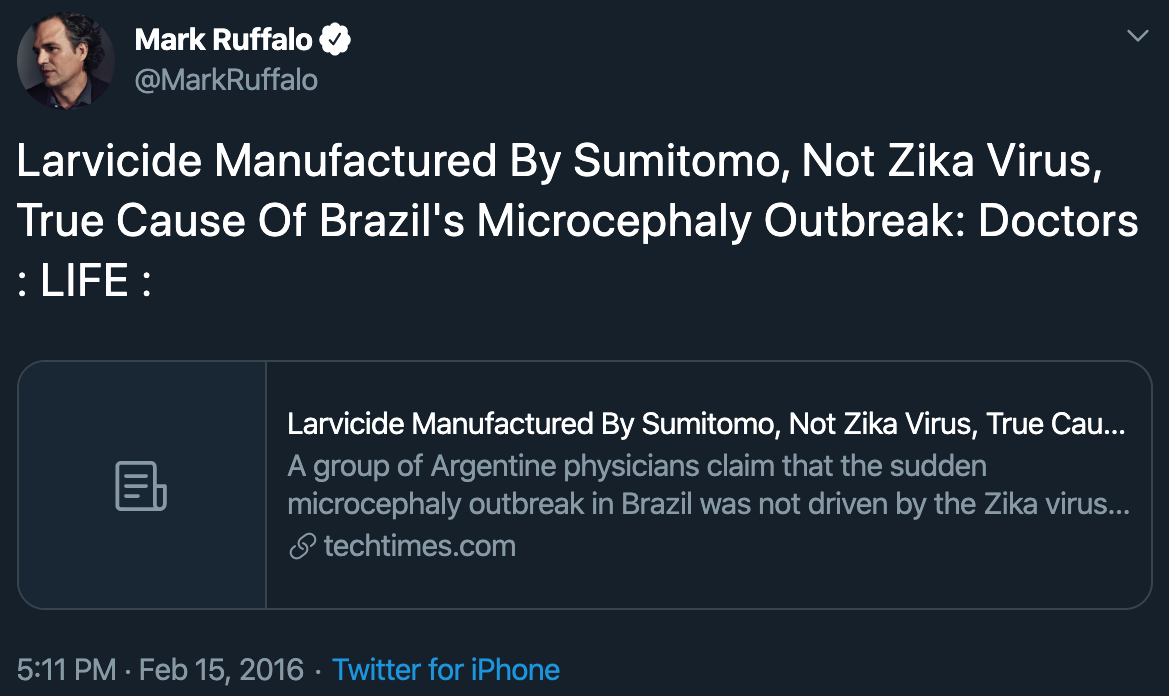Actor Mark Ruffalo, who played the Hulk in The Avengers series of movies, was invited to testify to Congress on an incredibly important public health topic regarding the intersection of chemistry, toxicology, and epidemiology. What expertise does he have in those areas?
Well, none exactly, but he is a conspiracy theorist. (And he may have stayed at a Holiday Inn Express last night.) Before we dive into the absurdity of his congressional testimony, let's talk about Ruffalo's prolific conspiracy-mongering.
Mark Ruffalo is a 9/11 truther, which means he endorses the granddaddy of conspiracy theories, namely that the U.S. government helped destroy the World Trade Center. Apparently, Ruffalo considers himself something of a structural engineer. According to Insider, Ruffalo said in 2007, "My first reaction was, 'buildings don't fall down like that.' I've done quite a bit of my own research."
Hulk smash! is probably as good an explanation as any.
 Ruffalo also didn't buy what microbiologists had to say about the Zika virus outbreak in 2016. Zika is dangerous to pregnant mothers because it can cause a serious birth defect called microcephaly (literally "small head"), which can cause developmental abnormalities and other problems. But Ruffalo knew better. According to him, microcephaly was the result of pesticides. However, as the the New York Times noted, that is a conspiracy theory.
Ruffalo also didn't buy what microbiologists had to say about the Zika virus outbreak in 2016. Zika is dangerous to pregnant mothers because it can cause a serious birth defect called microcephaly (literally "small head"), which can cause developmental abnormalities and other problems. But Ruffalo knew better. According to him, microcephaly was the result of pesticides. However, as the the New York Times noted, that is a conspiracy theory.
GMOs? Mark Ruffalo rejects the scientific consensus on those too. And for good measure, he promotes the ramblings of internet conspiracy theorist and snake oil salesman Mike Adams, the purveyor of Natural News.
Given his vast expertise in structural engineering, infectious disease, and biotechnology, it's no wonder that Congress saw fit to invite Mark Ruffalo to give testimony on public health.
The Hulk Testifies to Congress on Public Health
Mark Ruffalo is playing the lead role in a new movie called Dark Waters, which is about the real-life story of a lawyer who hounded the company DuPont over a chemical called PFOA (perfluorooctanoic acid). PFOA falls under a class of chemicals known as PFAS (per- and polyfluoroalkyl substances).
PFOA and PFAS can be found absolutely everywhere in the environment and even in your body. The reason is two-fold: (1) They are widely used in multiple products due to their water- and grease-repelling properties, and (2) They don't degrade very easily, earning them the nickname "forever chemicals." This has rightly led to concerns over their safety.
Some evidence suggests that PFAS is linked to various kinds of cancer, while other research says the evidence isn't convincing. A report by the EPA says "that a PFOA drinking water concentration of 0.5 µg/L would correspond to a one-in-a-million increased risk of cancer."
The bottom line is that we don't really know what a "safe" level of PFOA or other PFAS chemical is. So far, the evidence indicates that these chemicals pose a very minor (perhaps negligible) risk to the average person, while there may be greater risks associated with high exposure (for instance, people who work directly with the chemicals). We should research them more and enact tighter regulations if the evidence supports it.
Will the movie Dark Waters clearly communicate this nuanced view? Of course it won't. Mark Ruffalo says he wants an environmental revolution, which means that Dark Waters is going to be Erin Brockovich redux. That's why he was invited to Congress: To spread fear instead of knowledge.
Because The Hulk became a mutant following exposure to gamma radiation, we look forward to Ruffalo's upcoming congressional testimonies on nuclear engineering and genomics.

